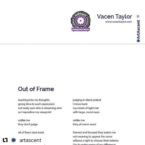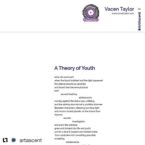My first book was published in 2013. That seems a long time ago now but for writing that’s not very long at all. If you add the time before that publication, there were a few blooper manuscripts. If you were to ask me how long I have been writing, I would have to say about ten years now. I’m sure many writers are much more productive than I am, but I didn’t just write novels.

I tried my writing skills in the field of short stories and entered them in competitions. Several of my stories were shortlisted, and many were not. That’s part of the experience of being a writer. You can read one of my short stories that



As I began to gain more and more confidence in finding my writing voice, I began to learn writing scripts, and stage plays. Each time I finished a script, I had learned something more about finding my voice. I have continued to write scripts with some success, proving that my skills are developing.

What have I learned?
*This won’t be the same for everyone. I have found these to be the most important things I have learned over the years of writing a fantasy series.
- The first or second and sometimes your third draft is never good enough to send to anyone. It has taken me several years to become satisfied with this idea. Unless you are a very skilled writer with a lot of experience behind you redrafting and editing will be necessary to provide a polished novel that is ready to send out to publishers. I wish I had taken this advice years ago. Perhaps this advice would have saved me many unnecessary rejection letters.
- Get to know your characters and story during the first draft. It is like meeting someone for the first time. The person will tell you a little bit about themselves but not everything. The fleshing out of the characters (for me) comes in the second draft and then the third draft. This is my process for getting to know more details about their personality, their values, and how they react, think and feel. Often this part needs to be refined over another draft. Sometimes more drafts are necessary.
- Your writing voice will arrive eventually. Not everyone finds their writing voice in the first book they write. Reading and writing contribute to finding your unique voice. You know how each of us like particular writers who we enjoy reading. Well, this is our way of knowing what style of writing we may sway towards. Some of us will then move towards finding our way to write in that particular style.
- Rejection is normal. Rejection will happen. Rejection is not a negative. Rejection is a way to understand several different things. (a) Your manuscript may not be reader ready. That is hard to hear, right? But sometimes a fresh pair of eyes over a manuscript will help you realise this. Find a reader to read your work. Or find an editor do a structural edit (if one has not been done) on the manuscript. Often these kinds of reader reviews are worth the time and money. (b) Your manuscript may not be right for that particular publisher. To avoid this problem it is wise to look at the types of books the publisher prefers to publish.
- Don’t give up. Writing is an art. Art takes time to produce.
These a just a few of the more important things I have learned over the years. You can find my books here on amazon
So until next time… “Be brave and bold in your chosen field of creativity. And never be afraid to explore new techniques”
Connect With Me